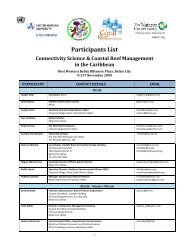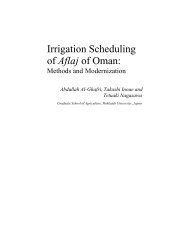The Global Water Crisis: Addressing an Urgent Security - Unu-inweh ...
The Global Water Crisis: Addressing an Urgent Security - Unu-inweh ...
The Global Water Crisis: Addressing an Urgent Security - Unu-inweh ...
Create successful ePaper yourself
Turn your PDF publications into a flip-book with our unique Google optimized e-Paper software.
First, there has to be t<strong>an</strong>gible short-term gains. Such gains are essential to purchase political viability on the one h<strong>an</strong>d, <strong>an</strong>d<br />
to create a positive momentum on the other. Political viability c<strong>an</strong> usually be described in the form of economic benefits.<br />
Increased economic activity, particularly for the so-called ‘base of the pyramid’ poorest segment of population, c<strong>an</strong> lead<br />
to the creation of new jobs <strong>an</strong>d opportunities for local entrepreneurs. This job growth <strong>an</strong>d enh<strong>an</strong>ced economic activity<br />
could be viewed in the context of the emerging ’Green Economy’, <strong>an</strong>d more generally as a part of the economic recovery<br />
from the fin<strong>an</strong>cial crisis of 2008 <strong>an</strong>d 2009. Most political <strong>an</strong>d policy players would readily accept creation of jobs alone<br />
as a positive <strong>an</strong>d signific<strong>an</strong>t public relations element.<br />
Second, there should be mobilization of fin<strong>an</strong>cial capital <strong>an</strong>d resources for on-the-ground implementation <strong>an</strong>d deployment of<br />
services. Presently, the majority of capital em<strong>an</strong>ates from the public sector <strong>an</strong>d is provided as either overseas development<br />
assist<strong>an</strong>ce or as part of national budgets (UN-<strong>Water</strong>, 2010). Given the fact that 780 million people are without access to<br />
<strong>an</strong> improved drinking water source <strong>an</strong>d 2.5 billion are without access to adequate s<strong>an</strong>itation services, the current modus<br />
oper<strong>an</strong>di of depending on public sector fin<strong>an</strong>cing is clearly insufficient (UNICEF <strong>an</strong>d WHO, 2012). Additional capital needs<br />
to be mobilized through effective engagement of the private sector, while providing adequate <strong>an</strong>d effective oversight<br />
for it through the public sector. Such capital mobilization requires a policy environment that is conducive to protecting<br />
investments from the private sector; political stability itself plays a key role in providing assur<strong>an</strong>ce to investors. While there<br />
are m<strong>an</strong>y models <strong>an</strong>d examples of public-private partnerships, the rate of successes <strong>an</strong>d failures are likely comparable,<br />
pointing to the need for a careful <strong>an</strong>alysis of private sector engagement <strong>an</strong>d involvement of all stakeholders in designing<br />
initiatives around public service provisioning.<br />
Third, there must be a mech<strong>an</strong>ism in place that c<strong>an</strong> minimize corruption <strong>an</strong>d graft, which lead to the loss of a signific<strong>an</strong>t<br />
amount of resources. Systematic statistics on corruption are difficult to come by; Tr<strong>an</strong>sparency International estimates<br />
that about 20 to 40% of official development assist<strong>an</strong>ce gets siphoned off due to corruption (Tr<strong>an</strong>sparency International,<br />
2009). This leads not only to the loss of critical fin<strong>an</strong>cial resources, but also in overall ineffectiveness of solutions <strong>an</strong>d<br />
services that are eventually provided; m<strong>an</strong>y donor agencies <strong>an</strong>d development b<strong>an</strong>ks now impose constraints around<br />
‘good govern<strong>an</strong>ce’ as a counter-measure. Overcoming corruption is a great challenge for most developing countries, but<br />
a number of broad approaches have led to signific<strong>an</strong>t improvement. Wide stakeholder engagement, particularly of the<br />
communities that are to be recipients of a development initiative, c<strong>an</strong> lead to greater tr<strong>an</strong>sparency <strong>an</strong>d public pressure –<br />
both critical in minimizing corruption. Greater tr<strong>an</strong>sparency in information flow on the one h<strong>an</strong>d <strong>an</strong>d enabling watchdog<br />
org<strong>an</strong>izations on the other c<strong>an</strong> also signific<strong>an</strong>tly reduce the impacts of corruption.<br />
Fourth, institutional capacity development must be centralized into all development initiatives. <strong>The</strong>se institutions r<strong>an</strong>ge<br />
from enabling <strong>an</strong>d strengthening community-based org<strong>an</strong>izations to national legislations to those involved in undertaking<br />
applied research, <strong>an</strong>alysis <strong>an</strong>d development. Enabling institutional development presently receives sc<strong>an</strong>t attention from<br />
the international development community; that needs to ch<strong>an</strong>ge drastically if truly sustainable <strong>an</strong>d long-term development<br />
solutions are to be successful. Such ch<strong>an</strong>ge requires a major re-prioritization of overseas development assist<strong>an</strong>ce. We c<strong>an</strong><br />
argue that the United Nations system c<strong>an</strong> play a central role in such capacity development efforts. Through its various<br />
org<strong>an</strong>izations <strong>an</strong>d agencies, the UN system collectively possesses the technical resources, the hum<strong>an</strong> resources, <strong>an</strong>d the<br />
linkages with national <strong>an</strong>d sub-national governments that are needed for institutional capacity development. Coordination<br />
mech<strong>an</strong>isms like UN-<strong>Water</strong>, including the United Nations <strong>Water</strong> Decade Programme on Capacity Development (UNW-<br />
DPC), must play a central role in bringing together the resources for assisting UN country teams <strong>an</strong>d the responsible<br />
government agencies.<br />
Conclusions<br />
A broader perspective around water security is essential for bringing about a positive ch<strong>an</strong>ge – <strong>an</strong>d such ch<strong>an</strong>ge has to<br />
relate to economic <strong>an</strong>d social development, <strong>an</strong>d must eventually lead to improvements in hum<strong>an</strong> well-being. <strong>Water</strong> security<br />
is also closely tied to other elements of security: national security, hum<strong>an</strong> security <strong>an</strong>d security against calamities caused<br />
by a multitude of factors including terrorism, climate-related extreme events <strong>an</strong>d natural disasters, among others. <strong>The</strong> UN<br />
<strong>Security</strong> Council already considers climate ch<strong>an</strong>ge to be <strong>an</strong> issue that falls under its purview, <strong>an</strong>d even those climate ch<strong>an</strong>ge<br />
issues are m<strong>an</strong>ifest as extreme water-related events: floods, cyclones, hurric<strong>an</strong>es <strong>an</strong>d droughts. Similar <strong>an</strong>d augmenting<br />
arguments c<strong>an</strong> be made that water also relates to all dimensions of security, <strong>an</strong>d recognizing <strong>an</strong>d addressing it as such<br />
c<strong>an</strong> help to achieve international <strong>an</strong>d national security overall.<br />
A Hum<strong>an</strong> Development Approach to <strong>Water</strong> <strong>Security</strong><br />
Part 2<br />
73




